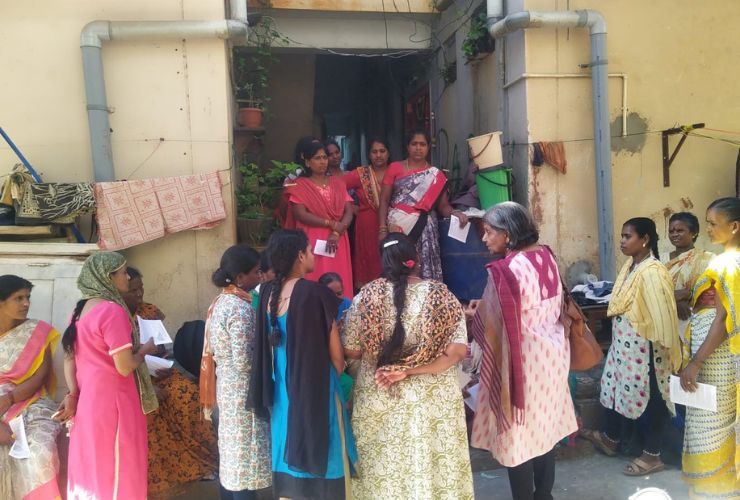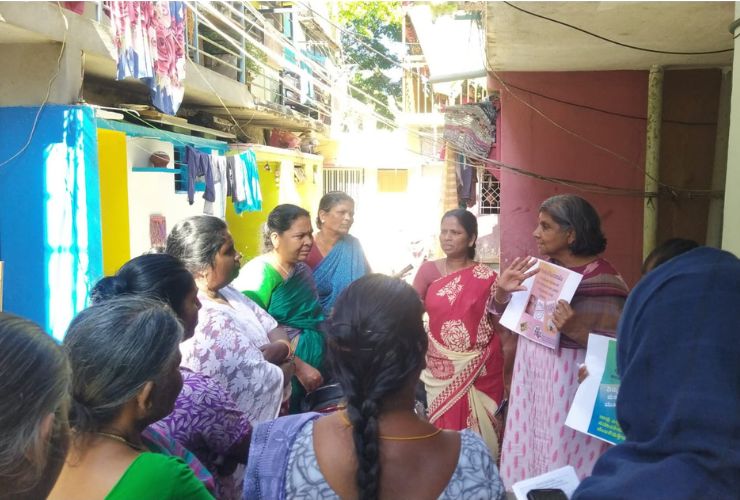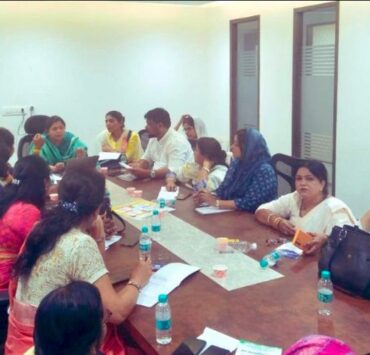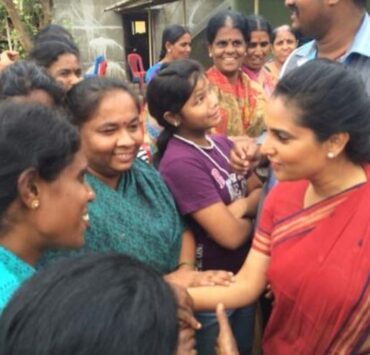
By Rehmat Merchant

Elections are a time of excitement – whether you’re a diligent party worker, an enthusiastic voter, a disinterested observer or, as in this case, part of a union. “Our members are eager to exercise their right to vote as they realise it’s an important right,” says Geeta Menon, Joint Secretary, Domestic Workers Rights Union (DWRU), which is active in Bengaluru, Belgaum, and Mangalore.
For many women, voting gives them some power which they may otherwise never taste. Your vote is your political identity. Who would know it better than women? Come elections the invisible women, supposedly hidden in the kitchen, are suddenly a cheque to cash in for the family as “party workers” come recruiting voters. Ferried into trucks to attend rallies or to beam while being doled out saris and goodies by candidates – the power of the Big V is not lost on them.
And if you’re part of a women’s union that is politically engaged in organisational work throughout the year, you’re well-schooled in the weight of a vote. DWRU has its own annual union elections in Bengaluru, Belgaum, and Mangalore. “Our women are very excited to take part in the union elections held every year. It is a very important time. We see an excitement and a keenness to take part in the process. The crowd that gathers for the elections is bigger than the turnout at our regular meetings,” says Geeta.
So whenever assembly or general elections are announced, DWRU as an organisation takes part in the electoral process with enthusiasm. “Whatever you say, elections are a time of hope and women are enthusiastic and eager, whatever the reality at the ground level,” says Geeta. At the same time, she observes helplessness and “nirasha” (disappointment) because candidates invariably do not bother to visit the area after elections, and do not keep promises made while campaigning.
The game never changes. Councillors do the mandatory rounds before polling day and then forget their constituencies. Many women are not even aware of who their representatives in the Legislative Assembly (MLAs) were over the past five years. According to her, “The women relate to the local corporator doing something for them or not. The MLA is too distant for them. But even with the corporator they only know about his work or the lack of it; they are not conscious of his party.”
Geeta’s experience has been varied on the ground. In many areas, the general feeling is that voters will be called for meetings and will go mainly to collect the perks. In certain areas, especially those with more voters belonging to minority communities, the women tend to be very clear that they would try not to allow communal parties to gain power. They want an alternative, a change. But in most localities, silence prevails: the women there are obviously already committed to vote for a particular party.
According to Geeta, unlike the experience during previous elections, this time candidates do not seem to have come to the areas where the women they work with live to do door-to-door campaigning for votes. The new trend seems to be to hold public rallies outside such areas, with the women being ferried to attend them. “By and large there is no real participation of women in the electoral process, except for attending rallies and casting votes. No one seems to be coming to the areas where they live and mobilising them. It’s as if it is all set. Only the agents have been doing the rounds,” says Geeta.
In focus group discussions in the areas where the union is active, the women are curiously silent – despite realities like inflation, gas cylinder price hikes, housing problems not being attended to, and day-to-day civic amenities being missing or inadequate. “For them, it’s just a question of survival and whoever looks after their needs even for a short period is the person they will vote for,” she explained.
“They are very clear that they will exercise their right to vote; they will go to whichever district they belong to and cast their vote,” she says. “But when it comes to voting most women go by the dictates of community, caste or money. They know there is very little honesty in the elections and that their vote can’t change anything. They take the money because they need it.”

DWRU is active in areas like South Bengaluru, Banashankari, Jayanagar, JP Nagar, Whitefield, HSR Layout and Koramangala. About 50 per cent of the women in the union are domestic workers. According to Geeta, many women have asserted their allegiance to the ruling dispensation, much depending on their language and community. “We as a union have limited impact on their political choices. Quite a few of them are already politically aligned. Most migrants depend on the ruling party for survival,” she pointed out.
So far DWRU has been having group discussions as part of the right-to-vote campaign. They talk about the importance of voting for the right candidate who can do good for the community. Since the women often have scant information about who the candidates in the area are, they are encouraged to find out. They are also encouraged to ask around among others living in the area what has happened over the last five years in terms of helping to make their lives better. Small leaflets listing important criteria to apply while choosing a candidate are distributed as part of the standard voter awareness campaign.
However, in view of the current political climate, there is a general feeling that it is important to say and do more. That is why DWRU plans to get more proactive closer to election day. “We thought of campaigning in two phases. When there is no strong opposition and votes are not likely to get dissipated, we will talk about the ‘Hate Beda’ (Say No to Hate) campaign. It is important to explain to them why the growing trend towards communal politics is harmful and can negatively affect their lives,” says Geeta.
At the end of meetings, Geeta and her colleagues are often asked who should they vote for. “We have not been telling them what we think openly because their defences may go up and they may withdraw from the whole voter awareness-building process, she says. “When they ask about the political situation we only talk about the dangers of hate and communal politics, divide and rule policies, etc. During the last elections, we asked them to vote against communal politics. But that doesn’t always work and they ask us: which party, what symbols?”
Ahead of the elections, DWRU, along with Bahutva Karnataka, a forum for justice, harmony and solidarity, recently released a report on the state of labour under the present government in Karnataka. They have also been having planning meetings with the Wake Up Karnataka (Eddelu Karnataka) forum regarding work towards the elections.
Based on an analysis of past elections done by Eddelu (Wake Up) Karnataka, constituencies have been identified on the basis of where which party is strong and/or has won by a small margin. On the basis of that their energies will likely be expended in Jayanagar, Hebbal, Dasarahallii, Mahadevapura, Byatarayanapura and Bangalore South. DWRU has a presence in Bangalore South, from Banashankari to Koramangala, as well as Jayanagar, where a large population of its members reside. But, according to Geeta, they are concentrating primarily on Jayanagar for the upcoming elections: “We don’t have the bandwidth to spread out more. Our members will spread awareness in the areas surrounding the polling booths along with Eddelu Karnataka.”
Caste and communal conflicts have taken place in various parts of Karnataka over the past few years and reports have been brought out about them. But, according to Geeta, how much such information has percolated down to the voting population is a matter of speculation. As she points out, “Those who have not seen, let alone experienced, the violence tend to be indifferent to it. This is not surprising since most ordinary women are caught up in their own lives and struggles.”
Voter awareness is also a challenge, she says. Most of the women do not understand the difference between council and state elections and confuse the two sets of elected representatives, often attributing favourable ward level performance to the party in power at the state level. That is why DWRU stresses on post-election vigilance and the importance of the right to recall.
Is Geeta wary of making her own political preferences apparent? “Our women relate to us and we have credibility with them thanks to the many years we have worked with them. So, when they ask who to vote for at the end of all this exposure, it looks stupid to not say anything. For the elections, we are working as Stree Jagruti Samiti, a women’s rights group that supports DWRU. We are not a non-government organisation with or without funds that come under the Foreign Contribution [Regulation] Act (FCRA). We are part of a mass movement, along with several other self-help groups and, of course, Eddelu Karnataka and Bahutva Karnataka. So there’s nothing to prevent us from taking sides in an election.”




